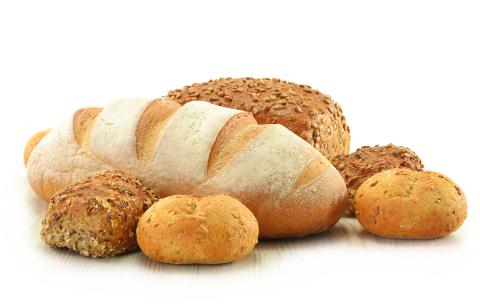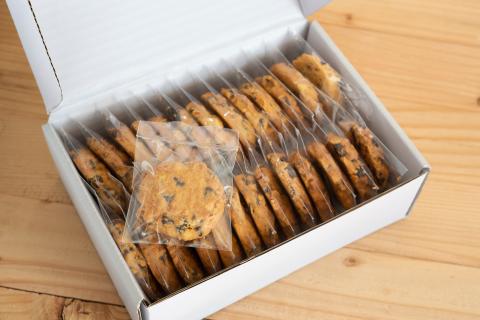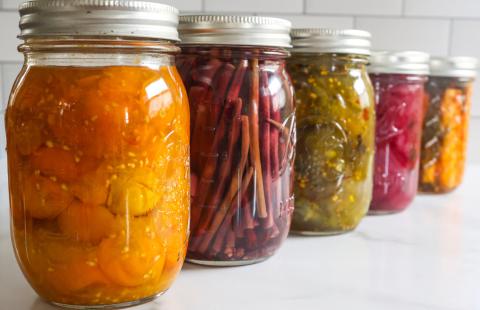Homestead License is NOT required (Exempt)
Selling Homemade Food Products in New Hampshire Starting a homestead food business is a dream of many home cooks. Beginning small, in your primary home kitchen, with shelf-stable baked goods and other approved foods is a practical way to try out this venture.
There are some food safety and legal requirements that will help to create a delicious and safe product. This fact sheet, based on New Hampshire Food Protection regulations, can help to get you started. There are 15 cities and towns in New Hampshire that are self-inspecting and may require additional requirements or don’t allow Homestead Operations. See the resource section for a link to a listing of the cities and towns.
You may sell homemade, “homestead” or “cottage” foods in New Hampshire without requiring a Homestead Food License, if you meet certain food safety requirements:
You may sell homemade, “homestead” or “cottage” foods in New Hampshire without requiring a Homestead Food License, if you meet certain food safety requirements.

1. What kind of foods can I sell?
You can sell foods that do not require Time and Temperature Control for safety (non-TCS foods). In the regulations, these low risk foods are also called non-Potentially Hazardous Foods.
This means you can sell baked goods, candies and foods listed below that do not require refrigeration to keep them safe.
Foods you can sell include:
- Breads, rolls
- Baked goods
- Brownies
- Cookies
- Candy
- Fudge
- Lollipops
- Sweet breads
- Muffins
- Dried herbs
- Double crusted fruit pies
- Packaged dry products, which include spices and herbs
- Roasted whole bean coffee or ground coffee
- Freeze-dried candy
- Acid foods, including vinegars, mustards, and BBQ sauces (BBQ sauces require a process review) [See Note #1]
- Acidified foods such as pickles, relishes, and salsa can be made by only using exact recipe/jars/process from the National Center for Home Food Preservation (https://nchfp.uga.edu – follow the links for pickled products and canning for salsas). If you “tweak” the recipe in any way, take one from the Internet, or use your own recipe, then the recipe must be process reviewed before being sold. This is necessary to determine if the recipe can safely be processed and is shelf stable. [See Note #1]
- Jams and Jellies can be made with a recipe from the National Center for Home Food Preservation https://nchfp.uga.edu. A process review is required if you use your own recipe, a recipe from the internet other than from NCFHP, or “tweak” a recipe found on the NCHFP website.
- Baked goods made with produce such as zucchini, pumpkin and banana are only allowed if they have been tested to be low moisture (water activity less than 0.85). [See Note #2]
- Homemade buttercream or cream cheese frosted baked goods are only allowed if they have been tested and found to have a pH less than 4.6 or water activity less than 0.85. [See Note #2]
Did you know?
A process review is required if you use your own jam, jelly, acid foods (vinegars, mustards, BBQ sauces), or acidified food recipe or “tweak” a recipe found on the National Center for Home Food Preservation website. [See Note #1]
Note #1 Process Review
Process reviews are required for processed or jarred foods using your own recipe and not the exact recipe, jars, or process from the National Center for Home Food Preservation. The food processing authority declares in writing whether there are biological food safety concerns with the food. Food products that have a pH below 4.6 or a water activity below 0.85 can be produced in the homestead. A list of food processing authorities is available from the New Hampshire Food Protection website section on food processing https://www.dhhs.nh.gov/programs-services/environmental-health-and-you/food-protection/food-processing-plants in the Frequently Asked Questions (FAQ) section.
Note #2 Water Activity Test
Moist quick breads like zucchini bread, pumpkin bread, banana bread, and homemade frostings may be considered TCS foods- needing refrigeration for safety- and cannot be made in a home kitchen, unless they have been tested to be safe. To determine if it is safe, it can be tested for water activity through the NH Public Health Laboratory by calling 603-271-4665.

2. What foods am I prohibited from making in a homestead kitchen?
Potentially hazardous foods not allowed to be made in a homestead kitchen include:
- Refrigerated pickles
- Meat (beef, pork, lamb)
- Poultry (chicken, turkey, duck)
- Fish - Shellfish and crustaceans
- Eggs, pickled • Milk and dairy products
- Cooked, plant-based foods (e.g., cooked rice, beans, or vegetables)
- Baked potatoes
- Cut fruit
- Cut vegetables and leafy greens
- Mushrooms
- Raw sprouts
- Tofu and soy-protein foods
- Garlic/herb and oil mixtures
- Cold brew coffee
- Kombucha
Important Information
Being license exempt, you are not allowed to offer food that requires refrigeration, or beverages such as kombucha or cold brew coffee as these products require a beverage license. Kombucha cannot be made under the Homestead Act; making it for sale requires a beverage license if the alcohol content is .5% or less. Over that limit, a liquor license is required.
3. Where can I sell my food products?
You must sell your food:
- from your own residence
- from your own farm stand
- at a farmer’s market
- at retail food store
For wider distribution, you will need a Homestead Food License. (See: The Basics, Part Two).
4. Foods must be sold individually packaged or wrapped and properly labeled.
Record Keeping
Keep accurate records of what you bake each day. Assign each package a batch code, which can be simply the date you produced the items. This will help you if you have a problem or product recall.
5. How must I label my Homestead Products?
You are required to label your individually packaged products with the following information:
a. Name, physical address, and phone number of the homestead food operation
b. Name of the homestead food product
c. The ingredients and sub-ingredients of the homestead product, in descending order by weight
d. The name of each major food allergen contained in the food unless it is already part of the common or usual name of the respective ingredient already disclosed in the ingredient statement.
Major food allergens:
- Milk
- Eggs
- Fish (e.g., bass, flounder, cod)
- Crustacean shellfish (e.g., crab, lobster, shrimp)
- Tree nuts (e.g., almonds, walnuts, pecans, coconut)
- Peanuts
- Wheat
- Soybeans
- Sesame
e. The label must also state in at least 10-point font “This product is exempt from New Hampshire licensing and inspection.”
f. Product code which identifies the product with a batch number. Note: this number can be your “baked on” date and “batch number”. For example: 1012-2 for the second batch of cookies made on October 12.
Example Label from NH DHHS Homestead Food Operations:

Chocolate Chip Cookies
Batch 1012-2
Ashley’s Cookies
2550 Kingston Lane
Anytown, NH 03333
(603)-555-5555
Ingredients: Enriched flour (Wheat flour, niacin, reduced iron, thiamine mononitrate, riboflavin and folic acid), butter (milk, salt), chocolate chips (sugar, chocolate liquor, cocoa butter, butterfat (milk), eggs, soy lecithin (as an emulsifier), walnuts, sugar.
Contains: wheat, eggs, milk, soy, walnuts
This product is exempt from New Hampshire licensing and inspection.
6. What equipment and procedures must I have in my residential home kitchen?
- Either a residential model dishwasher and a one-compartment sink OR a two-compartment sink to wash, rinse and sanitize your utensils.
- A home refrigerator with a thermometer. Refrigerator temperature maintained at 41°F or less.
- No pets in the kitchen during food preparation and packaging.
- If the bathroom opens directly to the kitchen, it must have a self-closing door and mechanical ventilation.
For More Information:
NH DHHS Food Protection dhhs.foodprotection@dhhs.nh.gov, 603-271-4589
https://www.dhhs.nh.gov/programs-services/environmental-health-and-you/food-protection
Homestead Food Operations
https://www.dhhs.nh.gov/programs-services/environmental-health-and-you/food-protection/homestead-food-operations
Food Processing Including Licensing, Food Processing Authorities, and Frequently Asked Questions
https://www.dhhs.nh.gov/programs-services/environmental-health-and-you/food-protection/food-processing-plants
New Hampshire He-P 2300 Sanitary Production and Distribution of Food
http://www.gencourt.state.nh.us/rules/state_agencies/he-p2300.html
NH Liquor Commission (for kombucha)
https://www.nh.gov/liquor/enforcement/contact-us/index.htm
NH Self-Inspecting Cities & Towns
https://www.dhhs.nh.gov/sites/g/files/ehbemt476/files/documents/2021-11/fp-selfinspect.pdf
NH DHHS Food Protection Beverage Licensing (i.e., Cold brew coffee)
https://www.dhhs.nh.gov/programs-services/environmental-health-and-you/food-protection/beverage-bottled-water-manufacturers
This work is supported by the Expanding the Reach of New Hampshire's Food Safety Education and FSMA Programs to Include Value Added Processors program, project award number 2018-70020-28876, from the U.S. Department of Agriculture’s National Institute of Food and Agriculture. Any opinions, findings, conclusions, or recommendations expressed in this publication are those of the author(s) and should not be construed to represent any official USDA or U.S. Government determination or policy.
Created: January 2023
Updated: January 2025
Special appreciation to Royann Bossidy of the NH Food Protection Section for her insights and guidance in putting together this fact sheet series.


